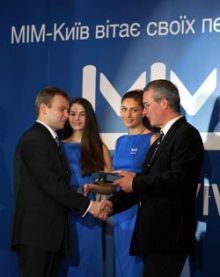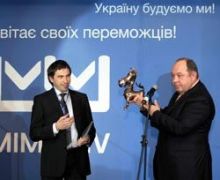“We are building Ukraine!” This slogan was emphasized by Iryna Tykhomyrova, president of the International Institute of Management (MIM-Kyiv), as she opened a meeting of the MIM business club on Nov. 28, 2009, at the Intercontinental Hotel in Kyiv.
“Today, we are starting a new tradition of awarding prizes to our winners in this festive atmosphere,” said she.
There is indeed something to celebrate. This year, 22 MIM graduates are rated among Ukraine’s 100 best managers. Oleksandr Fedchenko, president of the Incom Company, ranks first in this rating. Furthermore, this year’s winners of the International championship in strategic management and international business, Global Management Game, were awarded prizes at the meeting of the business club.
MIM-Kyiv teams have been taking an active part in the championship since 2000, inevitably winning top places and awards of the international supervisory board. In 2009, as many as four MIM teams have won the prizes of the Global Management Game.
“From my own experience I know that the high potential of ambitions developed in the MIM tends to play a crucial role in practice,” said Andrii Nahorny, MIM-Kyiv graduate of 2008 and runner-up for the Global Management Game-2008. “It is believed that when 10 percent of society has changed, entire society will change, too.
“It is the MIM ambition to gradually change the qualitative component in the Ukrainian business world. When this process reaches a critical point, a global breakthrough will occur.”
The MIM graduates do not forecast quick changes. In Nahorny’s view, we should expect a qualitative transformation of the Ukrainian market within eight to ten years, no less. However, for them the slogan “We are building Ukraine!” is not only an optimistic forecast, but to a certain extent a self-evident truth, as of today.
By now, MIM graduates have assumed key positions in the Ukrainian business and are now formulating the rules of the game on the market. They are the new business elite, and close at heels of the descendants of the nouveaux riches of the 1990s, whom they are now gradually ousting out of civilized business.
This might look somewhat visionary, but the MIM does not aspire to totally refine the business relations. “Our task is to create a critical mass of highly efficient professionals, who will understand and formulate civilized rules of the market game,” said Vitalii Haiduk, member of the MIM Supervisory Board and initiator of the business club session under the slogan “We are building Ukraine!”
“They will put pressure on their environment with their knowledge, competence, reputation, and will eventually change the rules, which do not arise by themselves. As to comfort in business, it has always been a very relative matter.”
This year’s winners received presents from The Day: a two-volume edition Extract 150, a photo album, and the book Ukraine Incognita.
“What Ukraine needs the most is success. Ukraine needs intelligent, spiritual, interesting, and advanced people. Indeed, among the present company there must be some future Ukrainian leaders. These books here are written by Ukrainian intellectuals, who reviewed the history and have set new supertasks for our society. I would like you to make good use of them. I think that truly professional Ukrainian managers will be able to bring true success to Ukraine,” said The Day’s editor in chief Larysa Ivshyna as she addressed the winners.
It is noteworthy that during this classy elitist event at one of Kyiv’s new hotels, the participants sympathized with their fellow countrymen on this special day. They, too, lit candles to commemorate the victims of the Great Famine.
COMMENTARY
Oleksandr PODOBNY, member of Global Management Game Supervisory Board:
“From the Global Management Game I learnt that there are three things that lead to success: an analytical approach to the situation, a responsible attitude, and, above all, a good and reliable team. These are the ‘three whales’ on which every business rests. Now these people are to implement this philosophy in real-life situations. They have all the necessary knowledge for it. I only want to wish them good health, because there is no wealth without health.”
Oleksandr FEDCHENKO, No. 1 in Ukraine’s 100 best top-managers:
“The crisis makes us ponder over the problems of efficacy. Just before the crisis broke out, we in our company declared 2008 the year of effective use of resources. I do wish all top managers in Ukraine would consider the optimum model for their businesses. Maybe they simply do not realize just how important it is.
“It is absolutely necessary to assess efficacy, and you can best do it by comparing your performance. I always compare my company’s performance with profitability indices of western companies. Theirs are five times better than ours. I began to analyze the reasons for such a gap. For example, I saw that we spent about three times as much resource for tax planning as our colleagues in the West did. Just fancy: all the efforts that we waste to pay the taxes are tantamount to the major resource costs, such as innovations, product creation, and sales.
“Another key condition for success is the rules of the market game. It might seem that our company, a leader in its sphere, might profit playing by its own rules. However, I personally initiated all the talks whose aim was to change the rules in order to make them civilized and transparent. In my opinion, the more MIM graduates are working on the Ukrainian market, the better the atmosphere.”
Viktor ADAMOVYCH, MIM-Kyiv graduate:
“MIM graduates always have an advantage over their rivals. In my opinion, they feel more at ease on the Ukrainian market. They know the tendencies and are able to combine theory and practice. I like the words of George Soros: when asked what one should do during the crisis, he answered that one should either be energetic or thrifty. MIM graduates are trained to be both energetic and thrifty, which empowers them for the future.”
Vitalii HAIDUK, member of MIM-Kyiv Supervisory Board:
“Ukraine made a dash from planned economics to the market without a proper understanding of what had actually happened. Clear-cut rules of the market game have yet to be established in Ukraine. Besides, our taxation system is not quite comfortable. There is too much red tape, and you always have to take the subjective factors into account.
“However, if 22 MIM graduates rank among 100 best top managers, it means that their competence allows them to create competitive and effective businesses even in such unfavorable conditions.”
Lina KHASAN-BEK, Professor, Department of Administration, International Institute of Management:
“Modern Ukrainian realities are not favorable for businesses to assume social responsibility. It is business owners’ private choice: whether they want and are able to be socially responsible, or look for a pretext to avoid it.
“The environment business is operating in demands that it be socially responsible. This is the call of the times. Those who are able to answer it are beginning to adapt to the environment right now. Others will simply have to do it, sooner or later. But it is the first ones who will gain long-term success, because they have already read the message of tomorrow. Social responsibility is not confined to giving someone money (though this certainly counts as a good deed). The main thing here is not to harm anyone.
“MIM is just the kind of intellectual and professional environment which will not let its graduates think otherwise.”
Yevhen MARCHUK, ex-prime minister of Ukraine:
“Unfortunately, MIM graduates are not numerous enough to be able to make a tangible effect on the Ukrainian economy and oppose such a complex phenomenon as corruption. But they must become established in business and set example for those young people who are outside the world of business enterprise. For example, if high school students, whose ideas of adult life are only beginning to take shape now, are faced with examples of honest, educated, successful young people, they will follow the same course. This will promote the amassing of the critical potential necessary for sound society.
“For modern Ukraine, MIM should have become a subject of continual discussion – but not in talk shows. These guys would not go into a talk show; they have a different mentality.
“It is so gratifying to see that the vast majority of MIM graduates uphold the thesis pronounced by one of their professors: ‘We do not live in a world; we live in a Ukrainian world.’ They understand that they will not build a successful business in this country unless Ukraine itself is successful.”








